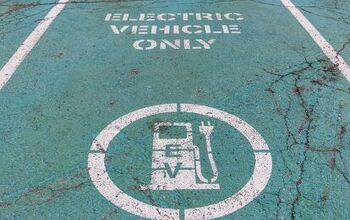Quebec Banning Gasoline Dependent Passenger Vehicles in 2035

On Monday, the Canadian province of Quebec announced it would be joining California and numerous European locales in the banning of gasoline-powered automobiles. Announced during a meeting regarding the region’s green economy plan, the French-speaking province said all new vehicles sold after 2035 would have to be entirely electric. Then there was a slight derailment as Premier François Legault used the occasion to publicly decry that it was “totally unacceptable” that some shop owners in Montreal are failing to greet customers in French and that the situation needed to be remedied immediately. Montreal Mayor Valérie Plante agreed, saying “clients must be able to get served in French. Period.”
One battle at a time, heroes. Justice will be served (and in glorious French) to those English-speaking heathens and their foul-smelling cars soon enough.
From Reuters:
Quebec will also renew the rebates on the purchase or rental of an electric vehicle and charging stations for citizens. Currently, the government offers individuals, businesses, organizations and Quebec municipalities a rebate of up to $6,100 on the purchase or lease of a new electric vehicle.
The government said it will also do its part by electrifying its provincial fleet of light vehicles as much as possible so that by 2030, 100 percent of its cars, vans and SUVs, as well as 25 percent of its pickups, will be electric.
The ban will bring Quebec in line with other jurisdictions such as California, the largest U.S. auto market, which in September announced a move to electric vehicles starting in 2035.
The Canadian province of British Columbia has already moved to phase out fuel-powered cars and trucks over a two-decade period, with a total ban on their sale or lease coming into effect in 2040.
Despite a large number of global leaders promising comprehensive, net-zero emissions plans, we’re dubious as to anybody achieving their environmental goals within the next decade. EV development is progressing more slowly than the industry had originally anticipated and there are real questions as to the sustainability of widespread electrification — especially without a complete and costly overhaul to the supporting infrastructure. We’ve already seen a few of these suggested internal combustion bans get pushed back by five years or more and imagine governments will continue moving the goalpost until circumstances actually allow for carbon neutrality.
It’s wonderful to see so many world leaders thinking about the future so often. But most of us have to live in the real world until it manages to catch up with the dream.
[Image: Jim Barber/Shutterstock]

Consumer advocate tracking industry trends and regulations. Before joining TTAC, Matt spent a decade working for marketing and research firms based in NYC. Clients included several of the world’s largest automakers, global tire brands, and aftermarket part suppliers. Dissatisfied, he pivoted to writing about cars. Since then, he has become an ardent supporter of the right-to-repair movement, been interviewed about the automotive sector by national broadcasts, participated in a few amateur rallying events, and driven more rental cars than anyone ever should. Handy with a wrench, Matt grew up surrounded by Detroit auto workers and learned to drive by twelve. A contrarian, Matt claims to prefer understeer and motorcycles.
More by Matt Posky
Latest Car Reviews
Read moreLatest Product Reviews
Read moreRecent Comments
- 28-Cars-Later “1. The Industrial Revolution and its consequences have been a disaster for the human race. They have greatly increased the life-expectancy of those of us who live in “advanced” countries, but they have destabilized society, have made life unfulfilling, have subjected human beings to indignities, have led to widespread psychological suffering (in the Third World to physical suffering as well) and have inflicted severe damage on the natural world. The continued development of technology will worsen the situation. It will certainly subject human beings to greater indignities and inflict greater damage on the natural world, it will probably lead to greater social disruption and psychological suffering, and it may lead to increased physical suffering even in “advanced” countries....It would be better to dump the whole stinking system and take the consequences”― Theodore J. Kaczynski, Ph.D., Industrial Society and Its Future, 1995.
- FreedMike "Automotive connectivity has clearly been a net negative for the end user..."Really? Here's a list of all the net negatives for me:1) Instead of lugging around a road atlas or smaller maps that do nothing but distract me from driving, and don't tell me where to go once I've reached Point B, I can now just ask my car's navigation system to navigate me there. It'll even tell me how long it will take given current traffic conditions. 2) Instead of lugging around a box of a dozen or so cassette tapes that do nothing but distract me from driving, I can now just punch up a virtually endless library of music, podcasts, or audiobooks on the screen, push a button, and play them. 3) I can tell my car, "call (insert name here)" and the call is made without taking my hands off the wheel.4) I can tell my car, "text (insert name here)" and the system takes my dictation, sends me the text, and reads off any replies. 5) I can order up food on my screen, show up at the restaurant, and they'll have it waiting for me. 6) I can pull up a weather map that allows me to see things like hailstorms in my path. 7) If I'm in trouble, I can push a "SOS" button and help will be sent. 8) Using my phone, I can locate my car on a map and navigate to it on foot, and tell it to turn on the heat, A/C, or defrosters.None of these are benefits? Sorry, not sorry...I like them all. Why wouldn't I? Consumers clearly also like this stuff, and if they didn't, none of it would be included in cars. Now, maybe Matt doesn't find these to be beneficial. Fair enough! But he should not declare these things as a "net negative" for the rest of us. That's presumption. So...given all that, what's the answer here? Matt seems to think the answer is to "unplug" and go back to paper maps, boxes of music, and all that. Again, if that's Matt's bag, then fair enough. I mean, I've been there, and honestly, I don't want to go back, but if that's his bag, then go with God, I guess. But this isn't the solution for everyone, and saying otherwise is presumption. Here's a solution that DOES work for everyone: instead of throwing the baby out with the bathwater, clean the bathwater. You do that very, very simply: require clear, easy-to-understand disclosure of data sharing that happens as the result of all these connected services, and an equally clear, easy-to-understand method for opting out of said data sharing. That works better than turning the clock back to those thrilling days of 1990 when you had to refer to handwritten notes to get you to your date's house, or ripping SIM cards out of your car.
- Funky D What is the over-under for number of recalls in the first 5 years of ownership?
- Normie Dayyum! Great White Woman!The car, I mean. I could feel kinda safe in it.
- Slavuta "The telescreen received and transmitted simultaneously. Any sound that Winston made, above the level of a very low whisper, would be picked up by it; moreover, so long as he remained within the field of vision which the metal plaque commanded, he could be seen as well as heard. There was of course no way of knowing whether you were being watched at any given moment. " --- 1984


































Comments
Join the conversation
I don't plan on buying an EV in the near future but who knows if I am still driving and looking for a new car in 2035 or 2040 I might buy one if the price is competitive and the battery technology and infrastructure improves which it most likely will. If I bought an EV it would be less as a statement and more because I like it and it better meets my needs. A government mandate is not going to force me to buy something but competitive prices and improved technology and reliability would be a more important factor in my deciding to buy an EV.
@fleecy--True but the manufacturers are going to make the vehicles that sell. If few buy an EV then the manufacturer has little incentive to make them. I am not saying that EVs won't sell but the manufacturer is going to make the types of vehicles that are selling well. For example if the Government wanted most us us to buy compact and subcompact cars but most of us buy full size pickups or suvs then the manufacturer has little incentive to make compact and subcompact cars. I would likely buy an EV in the future if the price drops and the battery technology improves along with improve infrastructure. I doubt I would ever buy a Tesla but an EV competitively priced that can be serviced at most places would be a vehicle I would consider. Also affordable and readily available replacement parts for any parts that might wear out.